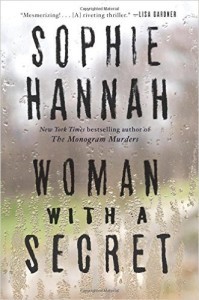Reader Expectations for Genre
By Elizabeth S. Craig, @elizabethscraig
I just finished reading Woman With a Secret (released as The Telling Error in the UK) by Sophie Hannah. I’ve read a fair number of unreliable narrator books lately. This one definitely caught my attention and sustained my interest.
One thing bothered me, as a reader and a writer. There were several points at the end where different police investigators of the murder (and it was a murder mystery, although it could also be called a psychological thriller…more on that later), clearly knew who the killer was. They stated they knew who the killer was, but didn’t let the reader in on it. It’s a quibble. But I’m a mystery writer.
This technique is still, technically, fair play in a mystery. The great Agatha Christie kept her readers on pins and needles as Poirot gathered everyone together in a room to disclose the killer’s identity.
But many modern mysteries allow readers to solve cases alongside the sleuth, letting us in on their thought processes. Since this novel had alternating POVs, readers weren’t always with the sleuth solving the case. We were also in the head of one of the suspects. Readers did have access to the same information that the police did, especially one very clever clue, I thought. The teasers, to me, were frustrating. One of the suspects said that they’d (trying to obscure plot points with a vague pronoun, sorry) figured out why the victim had perished the way he had. Then a detective said the same. Then another detective knew who the killer was.
It was just a little too much teasing for me. I might have been able to overlook one tease, but not several. Because, ultimately, the book was a whodunit. Or was it?
That’s what made me think. If this had been set up as more of a psychological thriller (which some reviews label the book as), then I think I might not have had the expectation that I could solve the case alongside the detective. If we’d had some short bits from the killer’s POV, maybe. But it was set up enough like a traditional mystery/whodunit that I was frustrated by a declaration of the case being figured out—and then a break to an alternating POV.
But the thing is…Ms. Hannah could very well be genre-blending. With thrillers, readers aren’t necessarily trying to solve the crime—frequently we know who the killer is at the beginning of the story. This book had elements of a psychological thriller and elements of a whodunit. Was the author trying to take on too much? Or are mystery readers’ expectations (and mine) too rigid?
As a writer, I strictly follow the tenets of my subgenre, cozy mysteries. The books, honestly, could be read by children because aside from the gore-free murders, there is nothing particularly disturbing about them. No profanity (well, none in all but the first couple of books), no sex, no descriptions of violence. Nothing very dark. The murders occur off-stage. The puzzles are (hopefully) clever and my use of deep-POV is intended to make the readers feel they’re solving the cases alongside the sleuth. My readers have certain expectations associated with the genre and I deliver what they’re looking for. This pleases me too, since I like being especially creative while writing within the limits, within the parameters, of my subgenre’s “rules.”
But I’ve enjoyed books in the past that have done a bit of genre-blending. Paranormal mysteries are fun. Mysteries with a bit of romance offer something a little different. So…is it just a problem when an author dispenses with such a large reader expectation—the almost interactive mystery experience?
I did enjoy the book. It certainly made me think as a mystery writer. My question is this: each genre has its own set of standards or conventions. Should we always pander to reader expectations? Obviously, from an artistic sense, we’re completely free to deviate from the framework. But when is it okay, from a commercial sense, to blur the lines a little with category fiction? How far can we/should we go? Any examples of bestselling books that have really colored outside the lines?
Should we always follow our readers' genre expectations?
Click To Tweet
The post Reader Expectations for Genre appeared first on Elizabeth Spann Craig.



